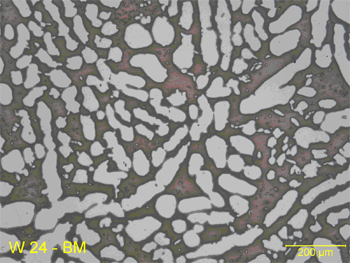

In-service Welding Procedure Development for Super Duplex Stainless Steel in Low Temperature Applications
Welding onto anything that contains product at pressure and/or under flow is considered an in-service weld. In-service welding is a common industry practice in both the transmission and refining industry with the vast majority of these welds being deposited onto carbon steel pipeline systems. Though carbon steel remains the material of choice for many piping systems, other materials are used for severe operating conditions including low temperature applications.
Low temperature applications include transport and storage of liquefied natural gases (LNG), nitrogen, propane, methane, ammonia, cryomedicine, food preservation and shipment, space applications, and superconducting devices. A number of engineering materials have been used in low-temperature applications including fine grained microalloyed steels, duplex / superduplex stainless steels (DSS / SDSS), Ni (1 to 9%) steels, maraging steels, austenitic stainless steels, Al alloys, titanium, and nickel alloys. In general, low-temperature service conditions mean high fabrication standards and, in many applications, the toughness requirements for welded joints are the same as for the base materials.
In-service welding has two main concerns. The first concern is for the safety of the personnel performing the welding that can be mitigated by eliminating the risk of burning through the pipe. The second is for the integrity of the piping system after the welding is completed, including cracking issues, and is addressed during qualification of the welding procedure. The integrity of the pipe after welding is based on the material being welded.
Repair of DSS and SDSS requires special care as additional heating and cooling cycles may affect the microstructure balance (austenite + ferrite) of the base or weld metals which could result in an unacceptable weld from either a mechanical or corrosion resistant perspective.
EWI has conducted research to determine the feasibility of in-service welding of SDSS, which are designed for low temperature operation [e.g.; down to -58ºF (-50ºC) or higher], under cryogenic conditions. The feasibility was determined by depositing bead-on-pipe and groove welds at different heat input welding conditions onto a liquid nitrogen filled section of pipe that produced an outside diameter surface temperature less than -200ºF (-129ºC) as well as weld cooling rates that are more severe than what would be expected in the field.
Under the welding conditions used, the ∆t12-8 and ∆t8-5 measured in the weld metal was 2.4 and 4.2 seconds, respectively, which correspond to cooling rates of about 166.0 and 71.4ºC/s. The measured cooling times were shorter than the preferred cooling times for DSS and SDSS, which are in the range of 4 to 15 s for Δt12/8 or approximately 8 to 30 s for Δt8/5.
The grain morphology, austenitic-phase shape and distribution in the weld metal and heat-affected zones (HAZ) changed as a function of welding conditions. However, no evidence of substantial precipitation of intermetallic phases or secondary austenite was observed. The welded joints showed good tensile, ductility, and impact Charpy properties. With the welding conditions used, the impact properties of the weld metal and HAZ were higher than those normally required by different standards including ASME Section VIII, British Standard BS5500, and DIN specifications.
Due to the growing demand for natural gas, the liquefied natural gas (LNG) industry is booming. The huge increase in the LNG infrastructure could lead to potential requirements for repair and modification of operating facilities. A majority of the LNG facilities are constructed out of austenitic stainless steel grades (e.g., 304 or 316L), 9% Ni steels or Invar (36% Nickel-Iron alloy). Development of low temperature in-service welding procedures on these materials is needed to address the growing LNG industry.
For more information, contact Matt Boring at [email protected] or 614.688.5525, or Jose Ramirez at [email protected] or 614.688.5238.